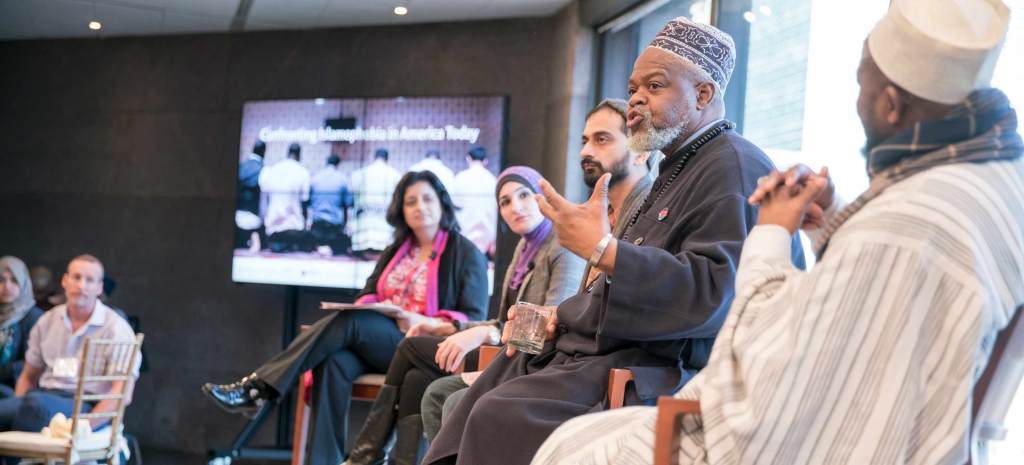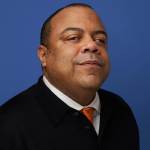 Simon Luethi ©Ford Foundation
Simon Luethi ©Ford FoundationIt’s clear that there has been a troubling rise in xenophobic political rhetoric, hate speech, and brazen incidents of violence against American Muslim, South Asian, and Arab communities in the United States. In the months following the peak of the Syrian refugee crisis, hate crimes against American Muslims tripled. In recent days, police in Fort Wayne, Indiana, has been investigating the execution-style murders of three young American Muslims.
With demographic anxiety and political rhetoric fueling discrimination and hostility, the Ford Foundation—together with the New York Community Trust, the New York Foundation, and Philanthropy New York—hosted a discussion on “Confronting Islamophobia in America Today.” Leaders from the nonprofit, government, social service, and philanthropic sectors came together to discuss the major issues affecting these minority communities, and to strategize about how to advance inclusion. Here are some highlights from the day’s conversations.
We’re at risk of failing a generation of American Muslims
Participants agreed that discrimination and bigotry are worse for American Muslims today than they were in the months following 9/11. And as Linda Sarsour, executive director of the Arab American Association of New York, stressed, there is now a generation of young American Muslims who don’t have any reference to a pre-9/11 America, who only know and experience an America “that doesn’t love them, doesn’t embrace them, [and] doesn’t think they belong here.” If the “acceptable bigotry” we’re seeing continues—if more Americans don’t speak out against Islamophobia, and if policymakers and government continue to fall short in providing support for the community—we will fail this generation of young American Muslims.
Accessibility Statement
- All videos produced by the Ford Foundation since 2020 include captions and downloadable transcripts. For videos where visuals require additional understanding, we offer audio-described versions.
- We are continuing to make videos produced prior to 2020 accessible.
- Videos from third-party sources (those not produced by the Ford Foundation) may not have captions, accessible transcripts, or audio descriptions.
- To improve accessibility beyond our site, we’ve created a free video accessibility WordPress plug-in.
Tackling anti-Muslim bigotry can’t be the only priority
Typically, we see the needs of American Muslims framed in one of two ways: in terms of national security reform, or anti-Muslim bigotry. Leaders are constantly stamping out prejudice-fueled fires, diverting attention and resources from equally pressing problems facing the community: issues like poverty, illiteracy, and the threat of deportation. Communities need an approach that addresses all of those issues, and resources to help develop the kind of educational and leadership programs that can build resilience amid conflict.
Accessibility Statement
- All videos produced by the Ford Foundation since 2020 include captions and downloadable transcripts. For videos where visuals require additional understanding, we offer audio-described versions.
- We are continuing to make videos produced prior to 2020 accessible.
- Videos from third-party sources (those not produced by the Ford Foundation) may not have captions, accessible transcripts, or audio descriptions.
- To improve accessibility beyond our site, we’ve created a free video accessibility WordPress plug-in.
American Muslims’ identities are complex, and about more than being Muslim
At a time when most young Americans have the luxury of time to discover who they are, Muslim youth are often presumed to be representing their community, and bear the burden of responsibility that comes with that. Too often, that means other parts of their lives—everything from going to the movies to struggling with poverty—are invisible. “We always have to know what’s going on because we constantly need to justify or explain ourselves and our [Muslim] ideologies and beliefs,” said Hebh Jamal, a 16 year-old New York City high school student and member of the Arab American Association of New York (AANY). (Jamal was featured in a recent New York Times article on this issue and the psychological, emotional, and social toll of anti-Muslim bigotry on young American Muslims.)
Accessibility Statement
- All videos produced by the Ford Foundation since 2020 include captions and downloadable transcripts. For videos where visuals require additional understanding, we offer audio-described versions.
- We are continuing to make videos produced prior to 2020 accessible.
- Videos from third-party sources (those not produced by the Ford Foundation) may not have captions, accessible transcripts, or audio descriptions.
- To improve accessibility beyond our site, we’ve created a free video accessibility WordPress plug-in.
Bigotry has roots in widely accepted policies
While terrorist attacks and global tensions unquestionably incite prejudice, there are other insidious drivers at work—namely, more than a decade of policies that officially sanction the marginalization of American Muslim communities. Official forms of discrimination pervade law enforcement, schools, and immigration policy, institutionalizing a system of bias that makes bigotry against Muslims acceptable in this country. As Fahd Ahmed, executive director of DRUM South Asian Organizing Center, powerfully argued, if the police are “indiscriminate against [American Muslim] communities, how can we expect the public to be any different?”
Accessibility Statement
- All videos produced by the Ford Foundation since 2020 include captions and downloadable transcripts. For videos where visuals require additional understanding, we offer audio-described versions.
- We are continuing to make videos produced prior to 2020 accessible.
- Videos from third-party sources (those not produced by the Ford Foundation) may not have captions, accessible transcripts, or audio descriptions.
- To improve accessibility beyond our site, we’ve created a free video accessibility WordPress plug-in.
